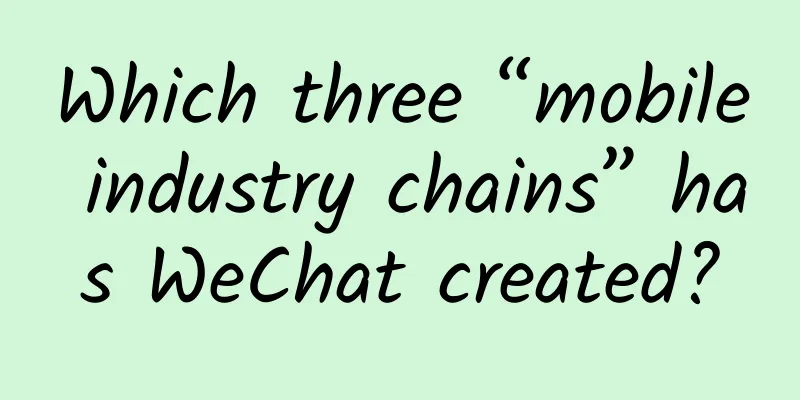Which three “mobile industry chains” has WeChat created?

|
Editor's Tips: One of the criteria for evaluating whether a product is sufficient is whether it can drive the industrial chain to achieve common prosperity. WeChat has also driven a new industrial chain, among which three forces are the most prominent, namely third-party developers, commercial WeChat accounts and WeChat purchasing agents in the circle of friends. One of the criteria for evaluating whether a product is sufficient is to see whether it can drive the industry chain to achieve common prosperity. Take Apple, which has just released the iPhone 6 and iWatch, for example. Its suppliers are all happy this fall. For example, the stock price of GT Advanced Technology, which supplies sapphire materials to Apple, has doubled in less than half a year, and NXP Semiconductors, which will provide technical support for over-the-counter payment for iPhone, has also risen by more than 15% in the past month. The same is true for the software industry, and WeChat is the best example for observation. In October last year, the number of WeChat users exceeded 600 million. According to forecasts, this number will reach a terrifying 1 billion this year. It took Tencent QQ a full ten years to achieve this result, while WeChat took less than four years. The mobile Internet contains a new round of demographic dividends. After establishing its entry advantage, WeChat quickly began to build an ecosystem with two major interfaces: open platform and public platform. Many third-party participants attached to WeChat began to grow. Xu Zhibin, a senior employee of Tencent, said in his book "Social Dividends" that a mature social platform will have a faster development speed for its partners. For example, when Twitter was not yet profitable, many third-party applications that parasitized it had already made their first pot of gold, and their support for Twitter has expanded Twitter's future imagination space. In China, WeChat has also driven a whole new industrial chain. The resonance between them and WeChat can be described as "like a fish in water, very exciting". Among them, three forces are the most prominent, namely third-party developers, commercial WeChat accounts and purchasing agents in the circle of friends. Third-party developers If traditional enterprises want to complete their transformation with the help of mobile Internet, it is far from enough to just listen to the lectures of WeChat marketing masters. Not every offline merchant has the capital to hire a technical team dedicated to developing the Internet market. "If you want to do your job well, you must first sharpen your tools." Outsourcing technical solutions to professional tool-based products has become the main means for traditional enterprises to carry out "WeChat marketing ." Take Diandianke, which just received RMB 40 million in round A financing, for example. According to market rumors, it may receive RMB 200 million in round B financing. It is a leading company in WeChat third-party development. Its products are a series of customized services. After traditional companies purchase them, they can manage and operate their own WeChat public accounts through simple front-end editing. In fact, Baidu’s newly launched “Direct Number” is based on the same idea, but Baidu’s “ light application ” platform lacks third-party intervention, so Baidu has to do it itself, while WeChat is not the case. Its marketing value is revealed too early, so third-party developers are also prepared for the entry. Strictly speaking, Tencent also has an official development tool, the "Tencent Wind Chime" launched by OMG. During the internal testing phase, it was widely criticized for "being both a player and a referee" because it obtained higher interface permissions than third-party developers. Later, the WeChat team implemented the equal rights movement to make the interface permissions of "Tencent Wind Chime" consistent with those of third-party developers, and then "Tencent Wind Chime" became lost in the crowd. The marketing rules designed by Diandianke for WeChat marketing are called the "four-step ladder method", which is a closed loop of display, promotion, interaction and transaction, all of which are included in the WeChat scene, without jumping out and interruption. Take a coffee shop as an example. It can select the "panorama" module in the display ladder to provide a 360-degree venue preview in the WeChat window to meet user expectations; in the promotion ladder, it can use the "micro Wi-Fi" module to allow customers to experience wireless Internet access after following the account, or open the "interactive wall" module to allow fans who follow the WeChat public account of the coffee shop to get to know each other and communicate; in the interactive ladder, the "fan card" module is suitable for attracting returning customers, allowing individual WeChat users to match corresponding discounts, improve fan stickiness, and drive fan economy; finally, the transaction ladder provides multiple payment channels (supporting full-scenario payment including WeChat payment , multiple third-party payment, POS payment, etc.), making consumption behavior a convenient and enjoyable experience. " Internet thinking " is glamorous, but what traditional enterprises really want is this kind of standardized product. Diandianke's business model comes from the sale of this set of tools in a split or combined form, with annual fees ranging from thousands to tens of thousands as income. The enterprise transformation market worth hundreds of billions of yuan, coupled with near-zero marginal sales costs, is the main reason why third-party developers are targeting WeChat. In addition to Diandianke, Koudaitong, which focuses on e-commerce, and Cheshangtong, which focuses on providing innovative WeChat gameplay for car 4S stores, are third-party developers with a competitive relationship. Although they have more or less overlap in customer resources, at this stage, it is a direction that is beneficial to all participants to expand the pie together. Commercial WeChat accounts A large number of big Weibo accounts that migrated from Sina Weibo died because they were unable to adapt to the communication rules of WeChat. Hot information on Weibo is short, concise and fast, and relies entirely on jokes to achieve a great result. Therefore, grassroots accounts only need to focus on a few high-quality content sources, such as Douban, Jiandan, Reddit, etc., to pick and use them. However, WeChat's user attributes are not as "pyramidized" as Weibo. Instead, they are closer to the mass circle represented by QQ Space in terms of aura. The "Zhiyin Style" and "Train Station Tabloid" genres dominate the information here. Weibo accounts that cannot adapt to this change are mostly frustrated by the speed at which WeChat accounts attract fans. WeChat big accounts can be regarded as taking advantage of the trend of self-media . With the positioning of vertical media, they quickly formed a push inertia, and then expanded their influence with the help of continuous mutual promotion. In this sense, WeChat big accounts also play a role in filling the gaps of the declining traditional media. Some investors have also tried to invest in some WeChat big accounts with high growth potential and "closer to money" in the angel round, especially in the real estate, e-commerce, finance and other industries. This kind of detailed layout is actually quite frequent, and it also makes the operation of WeChat big accounts a business that is sure to make money. At worst, everyone can make an electronic magazine updated daily and insert some advertisements to make money, right? In general, WeChat big accounts have achieved a very considerable positive cash flow in commercialization by using the new media path and extremely compressed costs, and they have also become content killers that have aggressively captured the circle of friends. A very simple example is that in 2013, media person An Ti wrote a column for Caixin's "New Century" titled "Genius Discovery on Poverty and Procrastination", which had a relatively ordinary dissemination effect. This article was found by WeChat big accounts a year later, and they changed the title to "Harvard Professor: Being Too Tired or Too Poor for a Long Time Will Make You an Stupid Person", and then it received millions of views. Le Bon said in The Crowd: "Perhaps it is particularly disappointing that to move the masses requires repetition and strong will, while reason can only go off the stage." Friends circle purchasing party WeChat’s Moments is a weird place. Although it is called “circle of friends”, it is often flooded with accounts that cannot be called “friends”, and most of the content has nothing to do with oneself. Among them, purchasing agents are the most commonly seen mysterious force. The purchasing agents in WeChat Moments are proof of the arrival of the era of the global village. Famous watches from Italy, handbags from France, women's shoes from Hong Kong, facial masks from South Korea, original orders from factories, authentic products that can be verified at counters... It seems that there is nothing in the world that they cannot get. And they are always sharing beautiful pictures of the nine-square grid and the messy scenes of packing and shipping. If you observe carefully, you may have the chance to find that the pictures posted by two purchasing agents who have no intersection with each other seem to be exactly the same. This is also an emerging industry chain with a gloomy tone. Merchants have always had a low status in Chinese history. Even in modern times, the crime of "speculation and profiteering" in the criminal law was not officially abolished until 1997. In traditional thinking, merchants do not engage in labor, but earn the difference by buying low and selling high. Lu Buwei, a tycoon in the Warring States Period, even regarded the prince of Qin as a commodity, saying that he was a "rare commodity to be hoarded and waited for a price increase" - this practice, even if it is not intolerable, is at least shameful to talk about. With the popularization of business concepts and common sense, the market economy has helped merchants to gain a good reputation, and this industry is also considered to be conducive to improving the efficiency of resource allocation by the market mechanism. Although the purchasing agents in the circle of friends look like small vendors, the role they actually play is at best a middleman who transfers information by taking advantage of information asymmetry. Simply put, the vast majority of purchasing agents are just agents. The reason why they can sell Givenchy today, Converse tomorrow, and anti-radiation bracelets the day after tomorrow - their business span is comparable to that of the world's top 500 companies - is that they are just acting as intermediaries, or "Taobao customers". In order to expand sales channels, special upstream distributors will prepare product copywriting, pictures, Q&A, and even on-site materials of factory production or shipping packaging in batches, and send them to various purchasing agents. They will post them in their friends circle to attract attention. For each order completed, they can get a commission. In addition, because the number of WeChat users is too large, each circle of friends is independent of each other, and the power of a single purchasing agent is difficult to achieve the ideal coverage, so the downline structure that imitates the pyramid scheme system is also widely used by purchasing agents. After joining, the downline will also receive complete training and materials, and part of the transaction volume completed by the downline will also be divided up by the upline. It is not difficult to understand why WeChat Moments has become a paradise for counterfeit goods. Non-scarce goods have already been leveled by the market. They can be purchased in physical stores, authorized dealers, and official online stores. In this case, the purchasing agents can only lower the consumption threshold and recreate asymmetric information with price scarcity - "you can't buy such cheap goods through ordinary channels" - and irrational decisions are made by WeChat Moments, which are familiar with each other. They know that there is no such thing as a free lunch, and there is no reason for a luxury product to sell a bag for 10,000 yuan in its physical store but supply goods for 1,000 yuan to a WeChat purchasing agent. However, there are always some fools who pay the bill by chance or because they can't resist the temptation. In the end, they gather together to feed the WeChat Moments purchasing industry chain. At least, in terms of the cost of fraud, purchasing on behalf of friends is much lower than TV shopping. The manpower and time used to operate the circle of friends are the cheapest in a labor-intensive country like China. I have met a person who hired a wild model with a daily salary of 1,000 yuan. He spent a week hanging around various nightclubs and bars, added 5,000 friends on a WeChat account, and then retracted the WeChat account to start sharing partial close-ups (cut from online pictures) every day, interspersed with some fragmentary commodity purchasing information, and finally recovered the cost within three days, and every subsequent transaction was a net profit. Of course, due to the supervision of WeChat, these accounts of his did not survive for long, but "wildfires cannot be extinguished, and spring breezes blow and they are reborn." If one dies, he will make another one. The monthly income from the rotation has exceeded 300,000. For these three forces attached to the WeChat industrial chain, third-party developers are seeds. WeChat embraces them and expects them to expand the value of WeChat to the transformation of traditional enterprises. Commercial WeChat accounts are fertilizers, with many uncontrollable factors. If used well, they can enrich the content ecology of WeChat, but if used poorly, they can easily hurt themselves and bring disasters. The purchasing agents in the circle of friends are poison. WeChat has been trying to expel them, but it cannot stop those users who have repeatedly lost to the blind weaknesses in human nature. WeChat is like a city built on this fertile farmland, bustling with people and abundant resources. Some people parade through the streets, some walk in fine clothes at night. When you look up, you can see flying eaves and jade carved railings. When you turn around, you can see some sneaky figures quietly appearing in the shadows of the walls at the end of the alley. "Whether good or bad, it is there, neither sad nor happy." [Author Lan Xi’s WeChat public account: techread] |
<<: Android Webview Java and Javascript safe interaction
>>: Several tips to improve Android ListView performance
Recommend
Use these UI experience optimization techniques to make your designs more advanced!
Hi, I'm Caiyun. We often talk about optimizin...
Focus on iterating the innovation rules of Ant Vision from 0 to 1
The emergence of new products is a creative proce...
Advertising strategies for 8 popular industries including education, home decoration, wedding photography, and tourism
In the blink of an eye, 2019 has come to an end. ...
Knowledge Planet Product Analysis
Community operation is the most important part of...
"All-rounder" non-destructive testing of fruits and vegetables: "Master of diagnosis" + "Damage detective" + "Quality gatekeeper"
The planting, storage, transportation, sales and ...
Do fried chicken and first snow go together? Here are 12 dangers you need to know
Northeast China has already welcomed the first sn...
How to eat glutinous rice balls during the Lantern Festival without becoming "round"? This anti-obesity strategy will make you sweet but not "greasy"
How to eat glutinous rice balls during Yuanxiao s...
The third round of 51CTO developer community administrator recruitment has been successfully completed
[51CTO.com original article] Thank you very much ...
Darwin was wrong? I didn't expect to come to this conclusion while singing karaoke...
Compiled by: Gong Zixin What does it feel like to...
Dangbei Box B1C: A smart “little magic cube” that makes old TVs look brand new
Nowadays, smart TVs have become widely popular, a...
After reading this, iOS fonts won’t be that difficult!
[[145301]] The motivation for writing this articl...
How to cook dog meat?
Dog meat contains a large amount of protein, and ...
Tips for APP promotion, double the effect!
Many optimizers often encounter such troubles dur...
Community Operation Growth Flywheel
We can start from the five major links of the com...
The mysterious LeTV shareholders meeting: there were more security guards than shareholders attending the meeting
LeTV (300104) held its first extraordinary genera...









